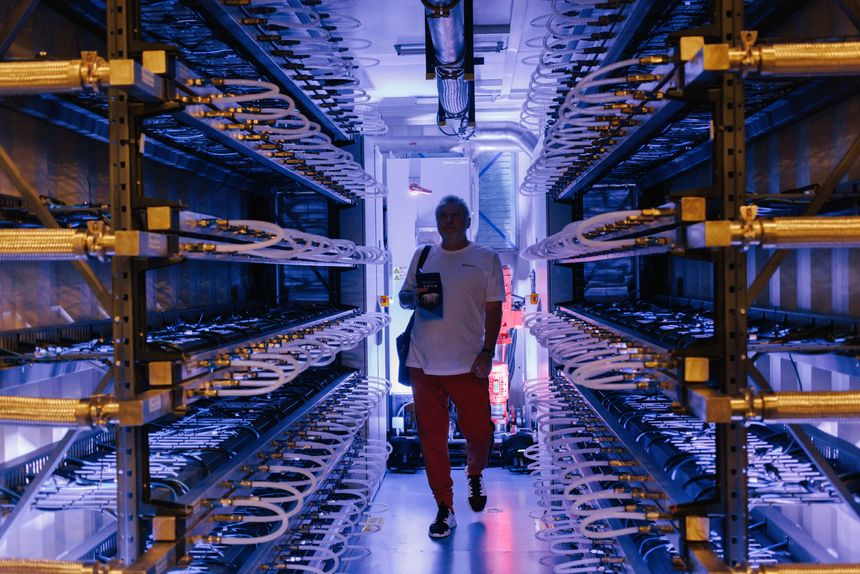Last year was harvest time for crypto miners. Now, they're getting hit on all sides.
Crypto prices are plunging. Miners' electricity bills are surging. Practically no one wants to buy their equipment.
It is a sharp turnaround from 2021, when crypto prices were soaring and many mining firms went on a mostly debt-funded buying spree of mining machines. But this year, crypto prices have been dropping and major crypto projects and companies have been wiped out. That has reduced the profits that miners can make from harvesting digital coins -- and from selling their equipment in a pinch.
Meanwhile, prices for electricity -- needed to keep the miners' powerful computers running -- are soaring. Russia's war with Ukraine has hamstrung global energy supplies, while an extreme heat wave has bolstered energy demand from families that need to cool their homes.
Shares of crypto miners Marathon Digital Holdings Inc., Riot Blockchain Inc. and Core Scientific Inc. are all down 55% or more this year.
"I don't think we are at the max pain yet in mining," said Amanda Fabiano, head of mining at Galaxy Digital.
Bitcoin miners set up and run the powerful computers that process bitcoin transactions. Those computers generate random numbers in hopes of finding the right combination to unlock formulas; the first to do so are rewarded with newly created bitcoins.
This makes it most profitable to mine bitcoin when the cryptocurrency's value is rising. Near bitcoin's 2021 peak, miners earned more than $60 million a day, according to data from Blockchain.com. Now, that number is around $19 million a day.
Last year bitcoin's value surged to nearly $70,000. This year the Federal Reserve started raising interest rates, scaring many investors away from assets like crypto. Last week bitcoin traded around $19,000. What is more, many once-highflying crypto lenders have buckled, leaving mining companies with few places for funding.
Crypto enthusiasts used to routinely mine bitcoin with one machine at home. Now, bitcoin mining companies run banks of high-powered -- and noisy -- computers to get the job done.
When bitcoin's value soared last year, bitcoin-mining machines became a hot commodity. The rush to load up on mining rigs then was akin to "buying spades in the middle of the gold rush," said Andy Long, chief executive of bitcoin miner White Rock Management.
Prices for the most-efficient tier of bitcoin miners are now one-third of their cost in December, according to Luxor Technology Corp., a bitcoin mining data analytics firm.
The steep decline has especially grave repercussions for the miners that borrowed funds to finance their equipment purchases last year. As bitcoin's price tumbled, these miners were forced to sell some of their mining rigs and bitcoin holdings to avoid running out of cash. But few people want to buy the machines on the secondary market, driving the price of mining machines even lower.
Some analysts worry that more forced selling of bitcoin could lie ahead, particularly as miners also struggle with energy-price shocks.
Average power prices for the largest users in Texas had climbed to 7.52 cents per kilowatt-hour in June, up 41% from the same month last year, according to government data. Their German equivalent was at EUR525 a megawatt hour this month, roughly equivalent to the same number in dollars and up almost 140% from last December. A White House report last week warned that crypto miners could strain the Texas power grid.
Two Georgia facilities used by bitcoin-mining company Compass Mining LLC recently had to close after their local utility providers increased electricity prices by 50%. Northern Data, a Frankfurt-based mining company, and other bitcoin miners said they were running mining machines only in the hours when power grids have less demand.
Publicly traded miners were forced to unload about 240,000 bitcoin at fire sale prices in May and June, according to Arcane Research, though the pressure has eased since then.
Miners of ether, the second-biggest cryptocurrency, face an even bleaker winter than their bitcoin counterparts.
Currently, crypto platform Ethereum uses a model similar to bitcoin, rewarding the fastest miners with new tokens. A software upgrade known as "the Merge" will change that. After the update, planned for this month, the Ethereum network will no longer require miners and their machines.
Already, there is less money to be made. Ether miners are averaging about $20 million in revenue a day, down from $50 million in 2021, according to crypto research firm CoinMetrics.
Ether miners will be able to migrate to platforms that still require miners, though those might not be as lucrative.
If ether miners decide to stop mining altogether, they can sell their machines to gaming or machine-learning companies, said Kyle Waters, a research analyst at CoinMetrics. That is because most ether mining machines have features that allow them to be repurposed, he said.

